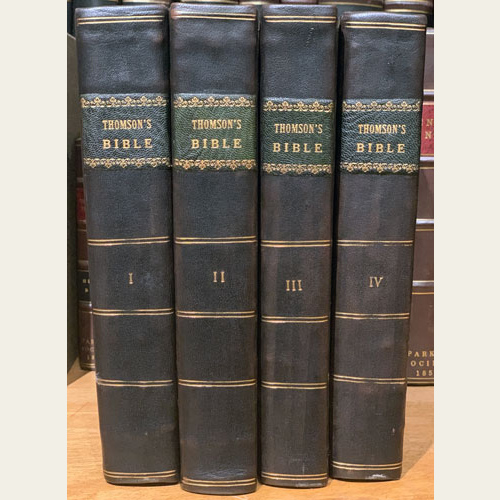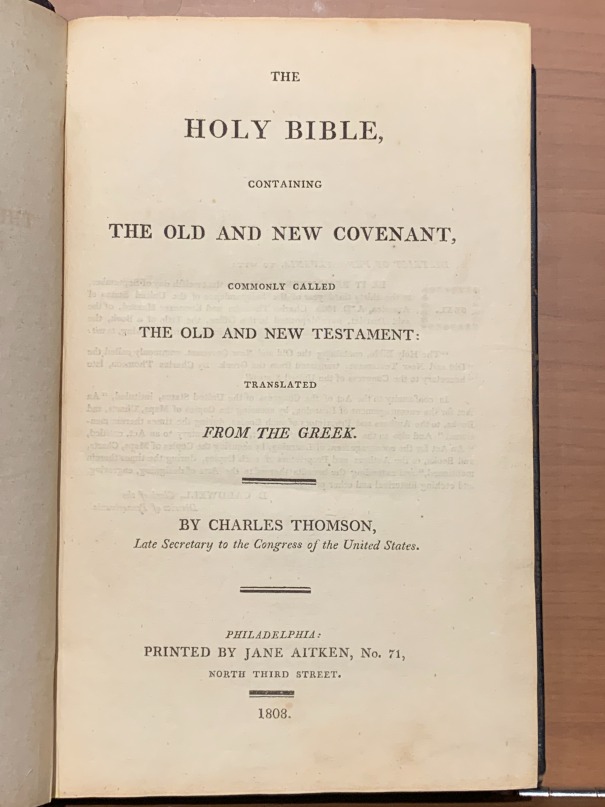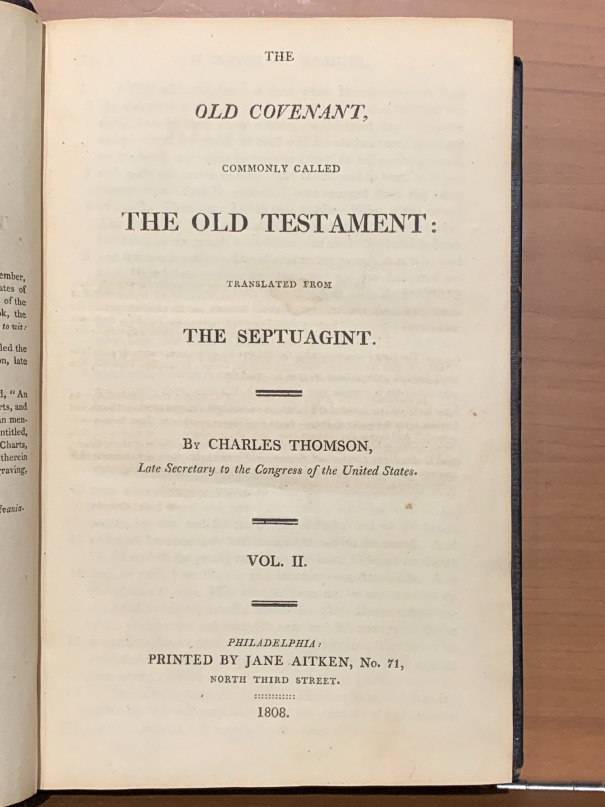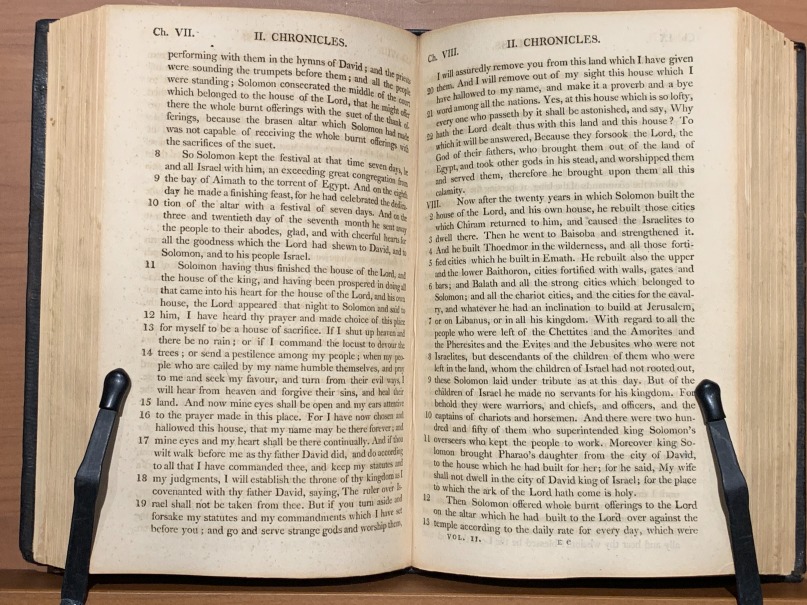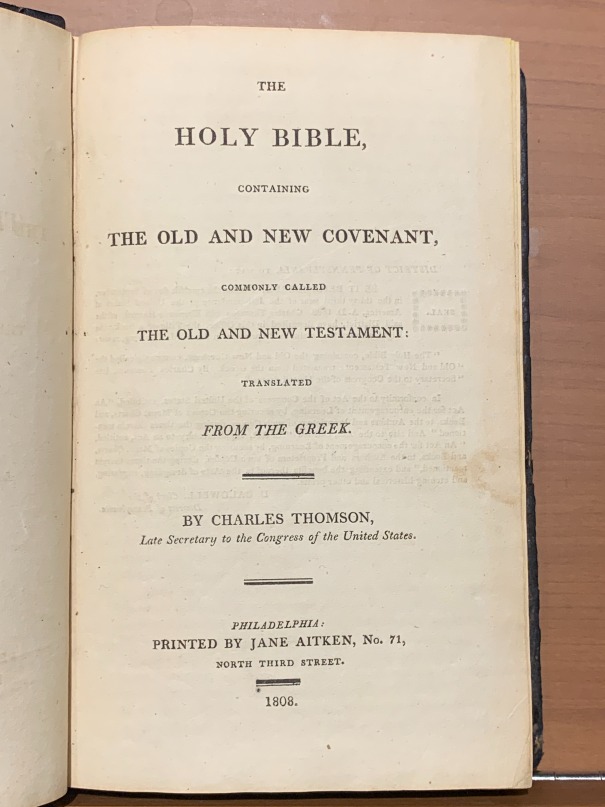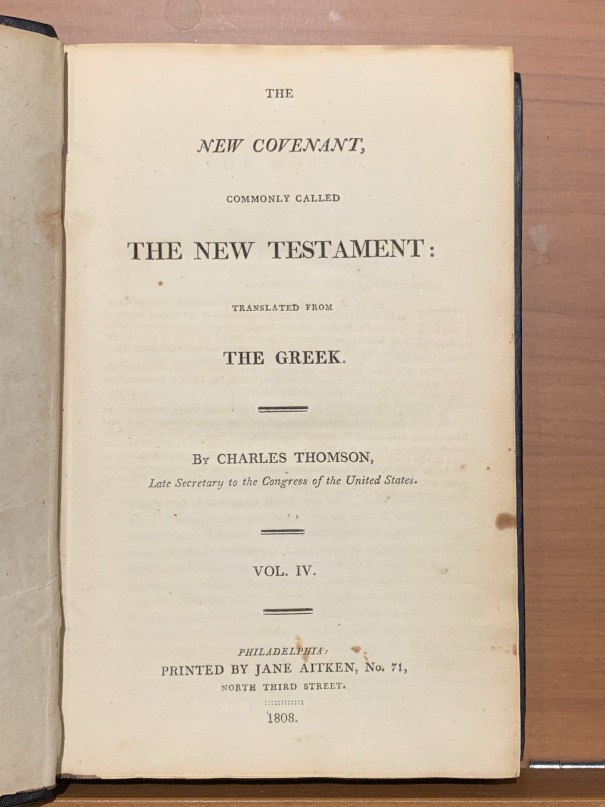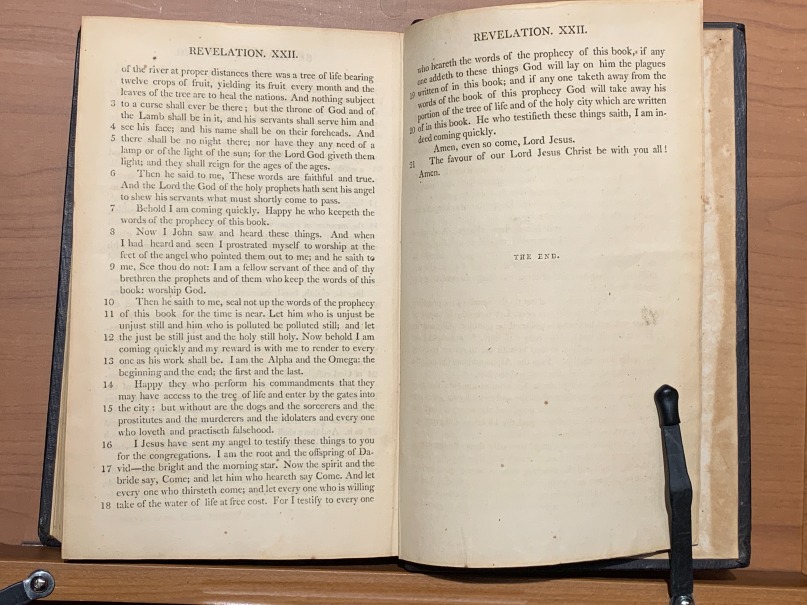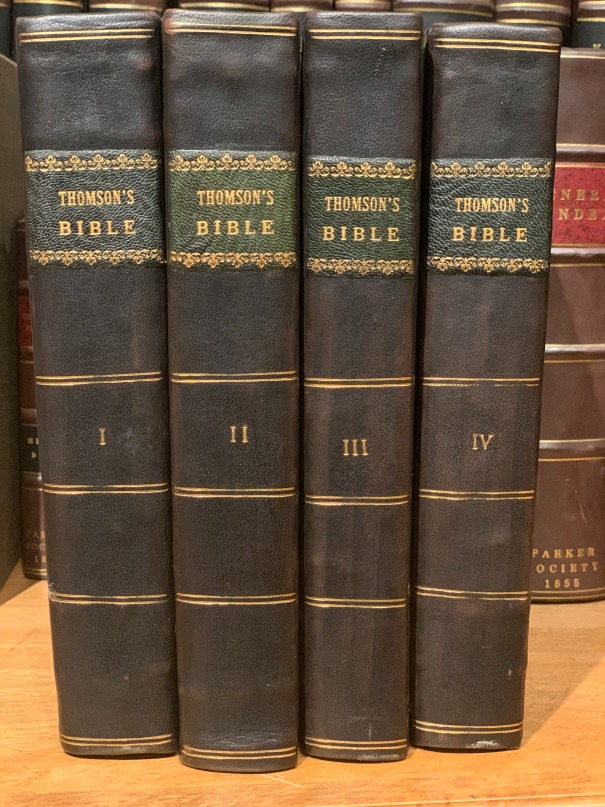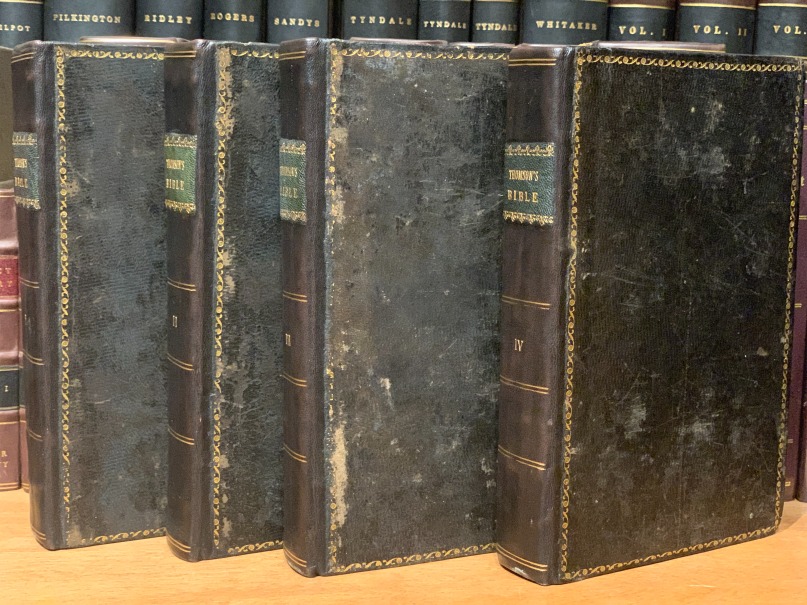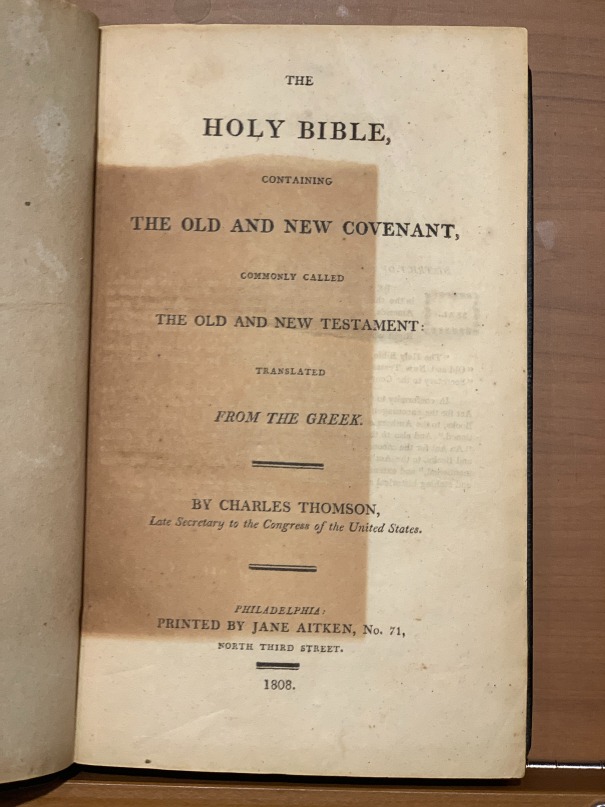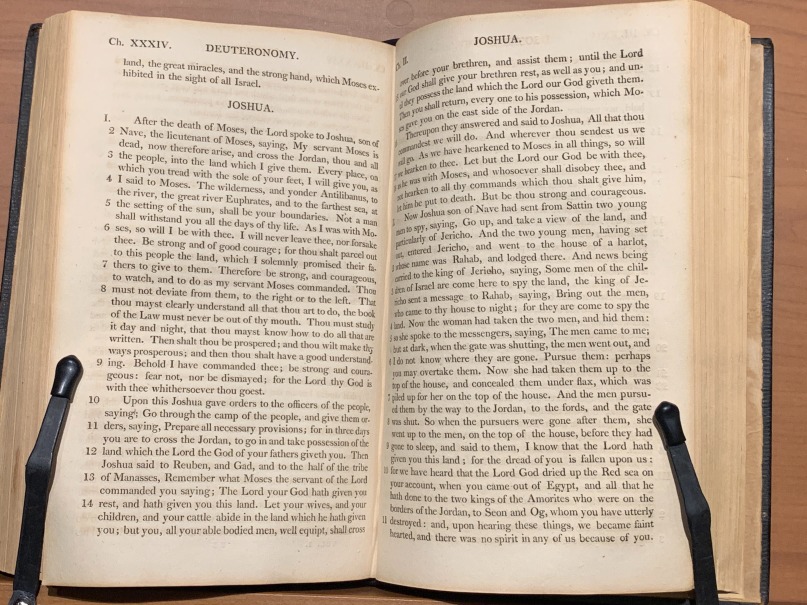1808 Charles Thomson / Jane Aitken Bible
$13,950.00
Charles Thomson
Title Page: 1808
Size: 9 x 7 x 2″
Font: Roman
Additional Features:
Printed by Jane Aitken The first Bible printed by a woman
Leather
End Papers: Cotton
Appraisal Value: $40,000
- Contact Us to order or inquire about this item.
- We accept credit cards and bank transfers as detailed here.
In stock
Description
Note: This is an extremely important milestone in printing history. This 1808 four volume Bible is the first Bible ever printed by a woman: Jane Aitken, daughter of the first man to ever print an English Bible in America (Robert Aitken in 1782). It is also the first new English translation (post-KJV) Bible printed in America, and the first English translation of the Greek Septuagint Old Testament anywhere. The translation itself was the work of the Secretary of the United States Congress. Fewer than twenty complete examples are thought to be extant today. This set, in wonderful condition, is offered at a small fraction of its appraisal value of $40,000… now being liquidated at only $13,950.
1808 Charles Thomson’s English-Language
Septuagint and New Testament
[Bible in English.] The/ Holy Bible,/ Containing/ The Old and New Covenant,/ Commonly Called/ The Old and New Testament:/ Translated From the Greek.
By Charles Thomson, Late Secretary to the Congress of the United States. Philadelphia: Printed by Jane Aitken, No. 71, North Third Street. 1808.
First edition. Four volumes, each with general title page and volume title page. Octavo format signed in fours. Complete. Published without The Apocrypha, though the Psalter contains Psalm 151 (unnumbered).
The first English translation of the Greek Septuagint anywhere.
Also the first English translation of the New Testament in the New World.
The first Bible printed by a woman: Jane Aitken, daughter of Robert Aitken who printed the very first English Bible in America (1782), which carried a printed endorsement by Charles Thomson (see note 1 below).
Thomson based this translation on the text of the second edition of the Greek Septuagint printed in England (see note 2 below).
Except for some general very light browning, this copy is in superb condition. Consistently clean and bright and pleasingly fresh. An approximately 3” by 5” area on the general title page of Vol. I is browned from offsetting from a piece of paper formerly laid in; similar offsetting in Exodus 32. Occasional minor flaws or stains (e.g. Vol. IV leaf zz in Colossians).
Old full diced black calf (light wear), lately rebacked to style with simple gilt.
Charles Thomson was born in County Derry. Ireland in 1729 and arrived in the American colonies in 1740 as an eleven-year-old orphan, his mother having died before embarkation and his father having died on the sea crossing with young Charles. He studied ancient languages and theology, and through the influence of Benjamin Franklin received the mastership of the Latin School of Philadelphia.
Thomson kept the records of the Treaty of Easton (1757) on behalf of the Indian tribes and was adopted into the Delaware Indian Nation; he was named by the Indians “Man of Truth.” He served as the Secretary of every Congress from 1774 until 1789. He designed the Great Seal of the United States. It was Thomson who officially informed George Washington of his election to the Presidency. On July 4th of 1776, only two signatures were affixed to the authentication copy of the unanimously adopted Declaration of Independence: those of John Hancock as President of the Congress and Charles Thomson as Secretary. However, when the calligraphic official version that is so well known today was ready shortly thereafter (ready by July 19th and signed by Congress on August 2nd), the Secretary’s signature was not required. After his retirement from public service, Charles Thomson devoted his time to Biblical studies and, specifically, nineteen years to this superb work of Biblical translation. Thomson died in 1824.
Herbert 1514. Darlow and Moule 1006. Hills, EBA, 153. DAB, XVIII, 481-2.
Note 1:
“Whereupon, RESOLVED, THAT the United States in Congress Assembled highly approve the pious and laudable undertaking of Mr. AITKEN, as subservient to the interest of religion, as well as an instance of the progress of arts in this country, and being satisfied … of his care and accuracy in the execution of the work, they recommend this edition of the Bible to the inhabitants of the United States and hereby authorize him to publish this Recommendation in the manner he shall think proper.” – CHA. THOMSON, Sec’ry (from the preliminary matter of the 1782 Aitken Bible, “The Bible of the Revolution”).
Note 2:
The Thomson translation is based on John Field’s Cambridge 1665 second English edition of the Septuagint (Darlow and Moule 4701), which similarly supplied a Greek NT to make a complete Bible. The first edition of the Greek Septuagint in England was London: R. Daniel, 1653 (DM 4692).
- Contact Us to order or inquire about this item.
- We accept credit cards and bank transfers as detailed here.

